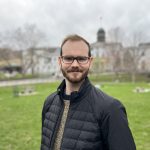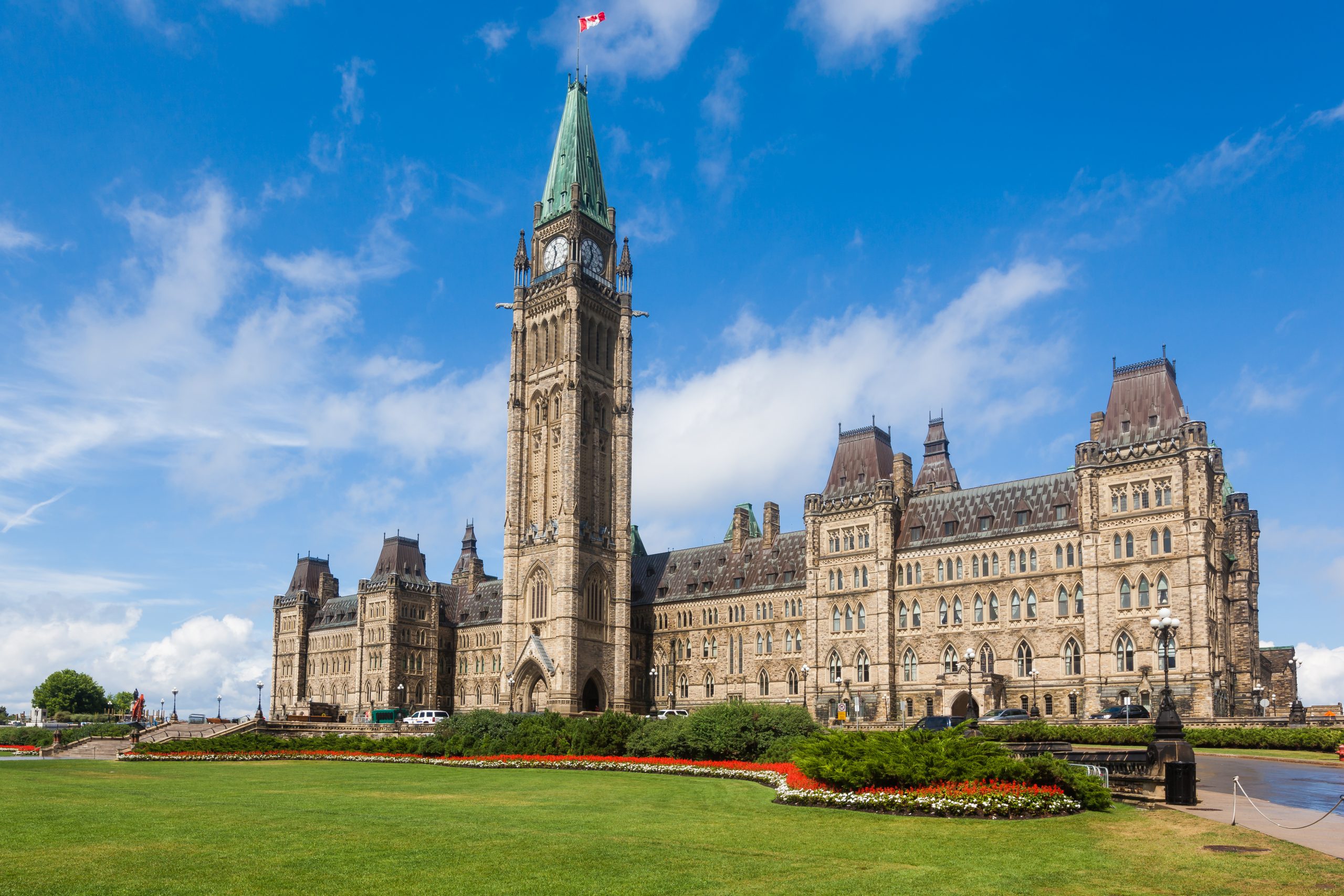Kael Kropp, Sydney Bartos and Karina Valcke-Beckett (MA’23) explored solutions to Vancouver’s housing crisis and climate change in a graduate course with Professor Kathy Harrison for their UBC Political Science master’s program.
In the first part of their Q&A, we spoke with them about how their collaboration turned into a report detailing policy solutions that could reduce renters’ carbon emissions, titled “Why Canada needs a rental-unit energy report card.”
In this half, Kael, Sydney and Karina tell us about how their experiences with research in their master’s program influenced their different career paths.
- Kael Kropp
- Sydney Bartos
- Karina Valcke-Beckett
What was the most interesting/exciting part of this project for you?
KK: We were lucky to present our project at CityStudio’s HUBBUB 19 showcase at Vancouver’s City Hall. Sydney, Karina, and I spent the morning engaging with community leaders, local politicians, business representatives, and residents about how our project fits into the city’s broader carbon emission reduction plans. It was incredibly validating to hear how well our policy option was received by everyone. Hearing our names called as the winners of the Best Project award was such an exciting moment for us.
SB: It was really exciting to be able to work on a project that immediately applied what we were learning in our graduate seminar to a real policy problem that the City of Vancouver is facing. I think it was a really valuable learning experience that allowed Kael, Karina and I to collaborate with community stakeholders beyond UBC, think critically and creatively and, ultimately, gain practical policy knowledge and experience.
I’ll also add, I think seeing all of the unique projects at CityStudio’s showcase was a really great testament to the innovation and insight that can come from student-led projects. It was exciting to see the City of Vancouver embracing this opportunity for co-creation.
KVB: A year after finishing this project, Sydney, Kael, and I decided to turn it into an op-ed with Policy Options to help advance our ideas to policy makers across the country. After spending months working on our project in the lead-up to HUBBUB, getting to revisit this idea and contemplate how it could be implemented at a national scale was incredibly rewarding and I think speaks to how much of our MA education has stuck with us months after graduating. Writing this piece gave us great practice with writing op-eds, and most importantly, a great excuse to hang out with each other even when we lived across three different provinces.
You have all taken very different paths following graduation. Why did you choose your path in academia/industry/government, and how has this project influenced your career journey?
KK: I chose a path in academia because I love teaching and researching, especially in Canadian and local politics. This project has deepened my passion for exploring urban governance issues and sharing my findings through publications and in the classroom. I enjoy mentoring students, discussing political dynamics, and supporting future scholars. Conducting local-level research keeps me connected with community organizations and aligns with my goal of being a community-engaged academic.
I’m committed to enhancing civic life for Canadians by understanding public administration and policy-making, especially at the municipal level, which is often overlooked but crucial. While I am now at McGill University, maintaining connections with UBC scholars like Dr. Carey Doberstein and Katelynn Kowalchuk deepens my understanding of urban governance and fosters valuable collaboration. Currently, I am supporting Dr. Doberstein’s project investigating arms-length agencies and authorities in Canada, focusing on performance, accountability, and politicization.
SB: I came into this degree with a background in communications and journalism, and while I’ve continued on the communications path after graduating, in my current role, I interact with other functions in our organization including community relations, external affairs and sustainability – all areas that relate to this project and my MA degree more broadly. Having gained a foundational understanding of policy-making and climate policy throughout this project and this course, I hope to continue gaining expertise in these areas as my career progresses.
KVB: Prior to working on this project, my experience with policy research was limited to academic research. POLI 533 with Dr. Kathryn Harrison was my first direct experience conducting policy analysis. I quickly realized how different it was to my previous experience with academic research, and how much I enjoyed it! Policy analysis tends to require close collaboration with peers (and, in this case, friends!), research across disciplines and jurisdictions, and creativity to address complex problems. All of the skills I learned from this project have made me a stronger policy analyst. Working on this project also helped me decide on a career path once I finished my MA.
How does this project relate to your work/interests/research now?
KK: This project directly aligns with my current research interests in the spatial politics of land use and urban governance. My proposed dissertation will continue exploring themes of urban land management, stakeholder dynamics, and historical institutional influences, which were central to this project. I’m particularly focused on the impacts of privatization and the need for equitable access to urban spaces. This project has provided a solid foundation for my dissertation and future academic endeavours, helping me contribute to the broader understanding of urban governance and policy-making in Canadian cities.
SB: Working in a communications role now, I would definitely say that one key aspect of this project was effectively communicating and presenting our proposed policy solution to community and government stakeholders. And I think that communicating effectively is integral in all of our chosen career paths. Beyond that, in my role I do get to interact with peers in community relations, external affairs and sustainability, and having worked on this project has provided me with a solid foundation in public policy and government relations that I can apply in my role.
KVB: As a policy analyst, I use many of the skills I learned during this project at work. For example, much of my job requires me to write concisely and communicate key issues effectively. Having to condense our work to pitch a rental-unit “Energy Report Card” to city staff at HUBBUB taught me how to communicate complex issues to individuals who are likely not familiar with the topic. It also taught me the importance of pairing research with creativity to find solutions to complex issues. And of course, this project has taught me the importance of asking the cost of utilities before signing a new lease!
About our alumni
Kael Kropp is completing his PhD in political science at McGill University as a SSHRC Canada Graduate Scholar, having previously earned his MA at the University of British Columbia. His research focuses on urban governance, public administration, and the spatial politics of land use.
Sydney Bartos is a communications professional in Toronto, ON. She earned her MA in political science at the University of British Columbia. Her research focuses on urban governance and climate policy.
Karina Valcke-Beckett earned her MA in political science from the University of British Columbia. Her research focuses on climate policy, public opinion and extreme weather events. She now works as a policy analyst.





